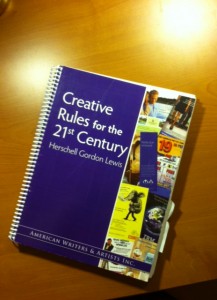
image courtesy of Simon Howden/freedigitalphotos.
net
Can you watch a Herschel Gordon Lewis film? You can if you like the ultimate in blood and guts. Known as the “undisputed godfather of gore,” Lewis is credited with single-handedly creating the “splatter” genre with his 1963 release, Blood Feast.
There is no way I’d watch a Herschel Gordon Lewis film. That’s because I’m a horror movie sissy.
But wait, there’s more to HGL than bloody bad taste.
You Can Sell Like Herschel Gordon Lewis
He started out as a college professor. Then he got into the advertising business in 1953 and among other duties, directing TV commercials. From there he invested in and directed film ventures, starting out with nudie films in the late 1950s. He only switched to horror because the popularity of his erotic films started to wane in the early 60s.
And therein lies the key to the advertising success of the Godfather of Gore. He made films solely with the intention of making a profit.
The formula:
Low budget + give audiences what they want with plenty of imagination = big money.
The same formula applies to your internet marketing and the content you create to move your website visitors to action.
Low budget + persuasive copy = big money

My copy of HGL's golden rules.
So, let’s get started with some of HGL’s fifteen easy-to-implement rules that effect response from his book, "Creative Rules for the 21st Century."
3 Logical Rules that Increase Response
Rule 1) The Negative Subtlety Rule
This rule has been tested and is mandatory in the visitor centric, search engine dominated Internet era.
The effectiveness of a direct response message whose purpose is to sell something decreases in direct ratio to an increase in subtlety.
Sneaking up on your reader may be fun for you, creative marketing manager that you are (and I understand this urge intimately!), but the trouble is, it doesn’t work very well.
Here’s the thing, a sales argument loses impact in direct ratio to an increase in subtlety.
Remember, your visitor can click away at the drop of a hat, so showing off your superior intellect by making him think too much is counterproductive to making money online.
Rule 2) The Active/Passive Rule
When you want your site visitor to take a direct action, write in the active voice. Like this, “Get website optimization for a powerful, lead generating site.”
Not, “Your site can be powerful and lead generating if you get website optimization.”
When you do not want accountability for a claim, use the passive voice. Like this, “It has been suggested that freezing fat cells can be just as effective as other procedures.”
Not, “Freezing fat cells is just as effective as other procedures.”
See the difference in accountability?
Rule 3) The Parity Superiority Rule
If you’re smart, you can “apparently” claim superiority without actually making a claim others can dispute. If your reader interprets your claim as one of superiority when it’s actually one of equivalency, good for you.
Try these out for size:
“No bank pays higher interest.” Here you’re actually saying that you pay the same interest as every other bank, but it sounds like you have the highest rate.
“Nobody sells for less.” Again, what you’re actually saying is your prices are the same as everyone else. But that's not the first impression of most of your site visitors.
“We’ll meet any discount price.” But we won’t be less than any other discount price.
Get it?
More Herschel Gordon Lewis to come in future posts. (Money making copywriting for businesses and marketing managers, that is, not The Gruesome Twosome!)
Until next time,
Nick
Nick Burns is a Web writer specializing in persuasive copywriting and content marketing. Nick’s services include SEO Web writing, website information architecture, content marketing, consulting, and publishing. He provides clients a winning online strategy plus the content writing to make it work. You can contact him here.
